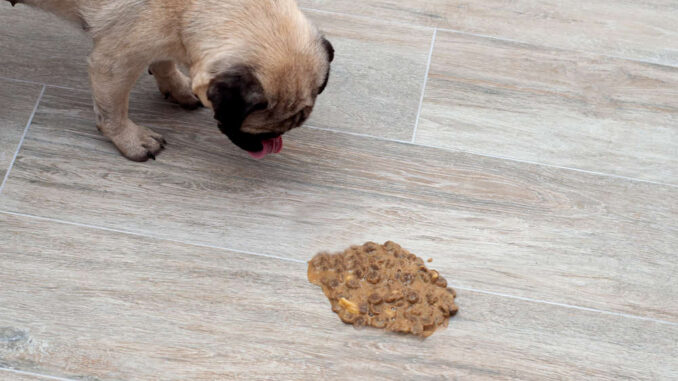
As alarming as it is when our dogs vomit, to see them bringing up brown liquid can be extra concerning. As a vet, I always ask owners to describe their pets’ vomit and to show me photos where possible. This is because the type, color and consistency of the vomit can provide us with a lot of information.
Vomiting is a very common issue for our furry companions, though brown vomit is something we see less often. It is not a specific sign, but certainly something we’d want to look into further.
What is the brown liquid that dogs vomit?
If vomit is brown, this could be due to several things including:
• Digested blood
• Brown food that was eaten, such as kibble. When partially digested, it can be hard to identify what it is exactly.
• The recent ingestion of foreign material, such as soil or feces
What are the causes of brown liquid vomit in dogs?
1. Digested food
Oftentimes when a dog brings up food that has been digested (whether fully or partially), it will appear brown. Indeed, a lot of the kibble and wet food we offer our dogs is a brown color to start off with.
Vomiting can have a huge range of causes and bringing up brown food is not a specific sign. We can see vomiting when a dog has e.g. an infection, parasites or an upset stomach due to eating something they should not have.
When a patient is vomiting, we want to determine if they are otherwise well. A one off vomit in a dog who is playful and happy to eat is likely not too significant. However, ongoing vomiting or vomiting that is accompanied by e.g. lethargy, food refusal or weight loss, is something worth looking into.
For mild stomach upsets, these can be managed from home with a bland diet and plenty of water. Owners might consider providing some probiotics and a rehydration solution, and should ensure their pets’ wormers are up to date.
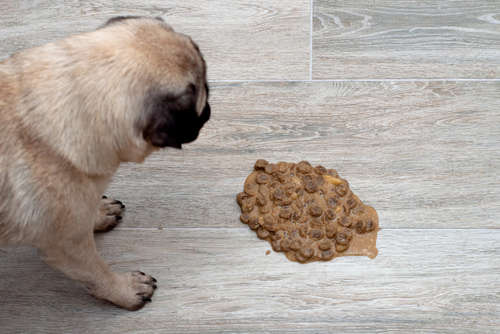
2. Ingestion of non-food material
Bringing up brown vomit could be a sign that your cheeky pooch has managed to eat something they should not have. If they have eaten something brown (like soil or the feces of another dog), this commonly causes brown vomit.
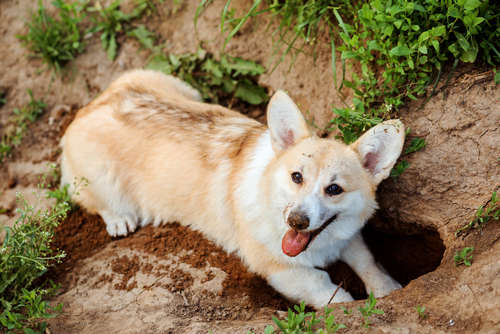
When the offending material is brought back up, dogs tend to feel better quickly and go about their day as normal.
It is a good idea to feed a bland diet of e.g. boiled chicken and rice for the next 24 hours. If this is an ongoing issue for your dog, consider that they may be bored or under-exercised. Eating things they should not can be a behavioral disorder, that is often driven by stress.
3. Toxin ingestion
We also need to consider if you dog may have ingested something toxic, such as human medicine like Ibuprofen. In these cases, we can see bloody vomit due to the internal bleeding and ulcers that are caused. We may also see tarry black feces or red blood in the vomit or stool.
If you are ever concerned your dog has eaten something they should not have, call your local vet right away. If they are not open, call the emergency service. With many toxicities, time is of the essence when it comes to treatment.
While it may be tempting to try and treat your dog from home, with any suspected toxin ingestion, we should bring them to the vet immediately. Treatment may consist inducing vomiting, providing IV fluids, feeding activated charcoal and, in some cases, gastric lavage.
4. Gastrointestinal ulcers
Stomach ulcers are not especially common in dogs, but can occur due to chronic renal disease or after a toxin ingestion, for example. On the picture below, we can see the inside of a dog’s stomach with small gastric ulcers. The tissue is red and inflamed and we can see areas that have been actively bleeding.
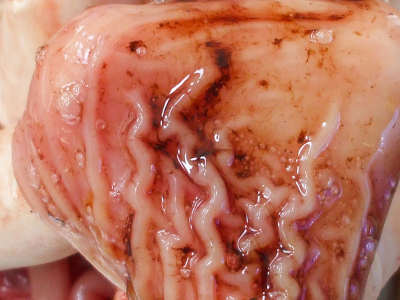
As well as signs of abdominal pain (like walking hunched over and refusing food), dogs may vomit fresh red blood or blood that is dark brown or black and tarry. The stool is generally affected too and can be soft, loose and red or black.
Ulcers can lead to infections and dehydration and do warrant urgent vet attention. Treatment can include fluids, antacids and antibiotics. Your dog may also be put on a prescription diet. If the cause of the ulcer is unclear, this would need to be looked into.
5. An intestinal blockage
Dogs can develop obstructions in their gut if they’ve eaten something large and indigestible, if the intestine telescopes in on itself or if they have a growth such as a cancer. As well as vomiting up old food (that can be brown and foul smelling), we might also see signs such as lethargy, food refusal, dehydration and diarrhea.
Some of the most common things I remove from dog’s intestines include corn cobs, plastic toys and socks and underwear.
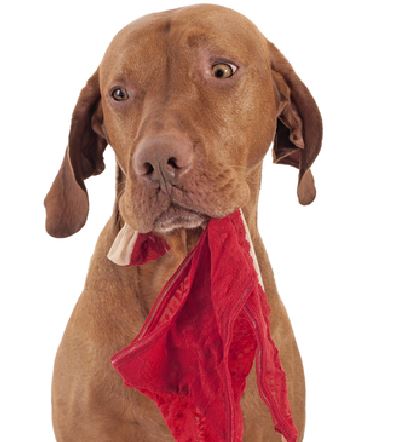
If your vet suspects a blockage, they will likely perform some imaging to check for its presence. This can include using a contrast, to better visualize any blockage.
If present, the blockage is usually treated surgically, unless it is high up in the GI tract and can be removed endoscopically. Removing the blockage promptly is key, as otherwise the local intestine can perforate, leading to a life-threatening infection.
What to do when your dog vomits brown liquid
Except in cases where your dog only vomits once or twice and is otherwise well, it is best to have brown vomiting looked into by a vet promptly. This would usually include a physical exam, and sometimes some tests such as a blood test and abdominal imaging.
Mild cases caused by dietary indiscretion (eating things they should not) or infections can frequently be managed from home after medicines such as anti-nausea medicine and antacids have been prescribed.
When the dog is poorly and dehydrated, they may need to be kept in the hospital on a drip while they recover. This tends to be the case for those with kidney disease and for dogs who’ve recently ingested a toxin.
Best Products to Help
1. Rehydration solutions such as Doggyrade
I prescribe rehydration solutions for most of the dogs who come into me vomiting, as they are typically not eating or drinking as much as they normally would, and are losing fluid in their vomit.
These solutions can speed up recovery and prevent salt imbalances. They also taste great, meaning your dog should be happy to drink them. These Doggyrade pouches are particularly handy as they come in portable pouches that are easy to open:
- A YUMMY DIGESTIVE & FAST REHYDRATION DRINK - DoggyRade is a healthy natural prebiotic drink that supports good intestinal health, digestive health & nutrient absorption in dogs. Plus, it is an isotonic drink that contains electrolytes to help dogs rehydrate quickly, like Gatorade for dogs. It increases fluid intake and contains electrolytes, helping dogs rehydrate quickly after exercise, when overheated, or even to encourage older dogs to drink more regularly, helping them avoid dehydration.
2. Probiotics such as Purina Fortiflora
Regardless of the cause of vomiting, providing probiotics can be helpful when it comes to ensuring the gut microbiome is healthy and that any ‘bad bacteria’ do not proliferate. Probiotics are especially useful for when a dog also has diarrhoea, as they’ve been clinically proven to reduce the recovery time.
This product should be given once the vomiting has stopped, to ensure it is kept down and can do its job. Your vet can guide you on how long to continue the probiotics, but it will usually be a minimum of 3 days:
- Number one probiotic supplement recommended by veterinarians (Kantar Veterinary Tracker, 2020)
When to seek veterinary care
When it comes to brown vomiting, as there are several potential causes that can be serious, it is never wrong to seek vet care as soon as the vomiting starts.
We’d want your dog seen urgently if their vomit also contains fresh red blood or black, tarry material as this tends to indicate internal bleeding. Other red flags would include dry or pale gums, abdominal bloating, lethargy and panting.
Your visit at the vet
Questions your vet will ask you
Your vet will want to know about your dog’s medical history, what medicine they are currently on and if they are up to date with their vaccines and wormer. They will also ask about any recent diet changes, and what your dog has been doing in the last few days.
Be sure to tell your vet about all of the symptoms your dog is displaying, when they started and what you’ve tried (if anything) so far.
Diagnosis & cost of diagnosis
Your vet will perform a full physical exam which will include an assessment of hydration levels and a temperature check. They will also check for any abdominal pain and may perform a rectal exam. In some cases, your vet will advise on further tests such as a blood test, abdominal imaging and/or stool analysis.
The cost of diagnosis will vary depending on which diagnostic tests are required. For mild stomach upsets that only require a vet check to diagnose, this won’t cost much more than $50. However, when a dog needs several diagnostic tests, that bill could be closer to $600.
Vet treatments & costs
Your dog’s treatment will depend on the cause of their brown vomiting and may well include some medicine such as anti nausea medicine and antacids as well as a bland diet. Medical therapy depends on a dog’s weight but will be in the region of $100-200.
In the case of your dog being dehydrated, or if they’ve eaten something toxic or developed renal disease, they will likely be kept in on a fluid drip. A few days of hospitalization can cost about $500, depending on the medicine needed and the size of the dog.
If your dog has a gut obstruction and requires surgery to remove this, the bill will be higher. We could be looking at costs up to $3,000.
Frequently Asked Questions
Can I use over-the-counter drugs to cure my dog?
For a mild stomach upset or in cases where your dog has ingested soil or feces, we can usually manage them from home. This can include the use of rehydration solutions, probiotics and sensitivity diets.
Is brown liquid vomit a serious issue to my dog?
While not always a sign of a serious issue, brown vomiting can be indicative of a life-threatening medical problem such as a gut obstruction or a recent toxicity. For this reason, having your dog examined by a vet is key.
Disclaimer: This website's content is not a substitute for veterinary care. Always consult with your veterinarian for healthcare decisions. Read More.




Be the first to comment